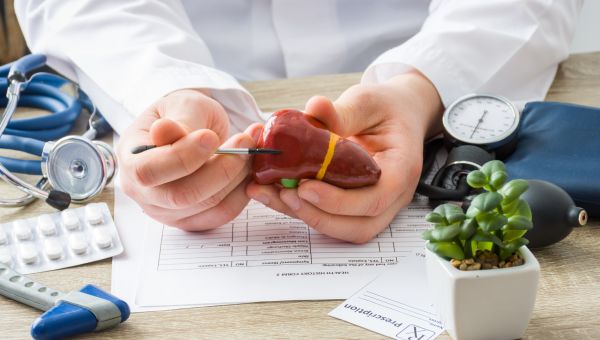When bloating may be something serious
Learn about six serious conditions that cause bloating.
Updated on September 13, 2022

Bloating: It’s that uncomfortable, overly full feeling in your gut caused by too much air or gas. Usually, bloating is just an unpleasant sensation that passes over the course of a few hours, often caused by something you ate. But it can sometimes be a symptom of a more serious condition.
You should always reach out to your healthcare provider (HCP) if you have… Show More
Bloating: It’s that uncomfortable, overly full feeling in your gut caused by too much air or gas. Usually, bloating is just an unpleasant sensation that passes over the course of a few hours, often caused by something you ate. But it can sometimes be a symptom of a more serious condition.
You should always reach out to your healthcare provider (HCP) if you have stomach pain with your bloating, or if bloating is interfering with your day-to-day activities. Meanwhile, here are six times bloating could indicate a serious issue.
Show Less
Diverticulitis
About half of people over age 60 have bulging pouches in their large intestines called diverticula, which are believed to develop from a diet low in fiber. The presence of these pouches is a condition called diverticulosis. When they become inflamed or infected, it’s called diverticulitis.
About half of people over age 60 have bulging pouches in their large intestines called diverticula, which are believed to develop from a diet low in fiber. The presence of these pouches is a condition called diverticulosis. When they become inflamed or infected, it’s called diverticulitis.
While diverticulosis typically doesn’t cause symptoms, diverticulitis can lead to bloating along with abdominal pain, nausea, vomiting, chills, cramps, and constipation. Providers may advise patients to eat foods high in fiber to prevent diverticula from becoming inflamed, but severe, repeated cases of diverticulitis may require surgical removal of part of the colon.
Show Less
Ovarian cancer
Ovarian cancer may be somewhat less common than other cancers—about 20,000 cases a year are diagnosed in the United States—but it causes more deaths than any other female reproductive cancer. Only about one in five cases are caught early because there are few reliable diagnostic tests.
When… Show More
Ovarian cancer may be somewhat less common than other cancers—about 20,000 cases a year are diagnosed in the United States—but it causes more deaths than any other female reproductive cancer. Only about one in five cases are caught early because there are few reliable diagnostic tests.
When someone has advanced ovarian cancer, their belly can fill up with fluids, called ascites, which can cause bloating. Other symptoms include abnormal periods, back pain, weight gain or loss, vaginal bleeding, and digestive symptoms like nausea, gas, constipation, and indigestion.
Show Less
Stomach cancer
Though the stomach cancer death rate has dropped greatly over time, it was among the deadliest cancers in the U.S. for decades. The majority of stomach cancers are found after they’ve spread beyond their initial location.
Stomach cancer symptoms include heartburn, feeling full, nausea, abdominal… Show More
Though the stomach cancer death rate has dropped greatly over time, it was among the deadliest cancers in the U.S. for decades. The majority of stomach cancers are found after they’ve spread beyond their initial location.
Stomach cancer symptoms include heartburn, feeling full, nausea, abdominal pain, and weight loss. People with stomach cancer can also experience bloating, due to a buildup of fluids in the belly.
Show Less
Pancreatic conditions
Your pancreas helps turn the food you eat into fuel for your body and helps regulate blood sugar. If the flow of enzymes from the pancreas to the small intestines gets blocked by gallstones or a pancreatic tumor, enzymes can travel back to the pancreas and cause inflammation, a condition called pancreatitis.

Irritable bowel syndrome
Irritable bowel syndrome (IBS) is an umbrella term for a group of uncomfortable digestive symptoms, which include bloating, gas, abdominal pain, constipation, and diarrhea.
Researchers aren’t exactly sure what causes IBS, but theories include abnormal intestinal contractions, food allergies, and… Show More
Irritable bowel syndrome (IBS) is an umbrella term for a group of uncomfortable digestive symptoms, which include bloating, gas, abdominal pain, constipation, and diarrhea.
Researchers aren’t exactly sure what causes IBS, but theories include abnormal intestinal contractions, food allergies, and overactive nerves in the bowels. Diet changes—such as getting more fiber and eating less dairy, legumes, and cruciferous vegetables—are often recommended as treatment.
Show Less
Celiac disease
Cutting gluten from your diet has been a health craze for years now. Most people don’t need to go gluten free, but there’s a group of about 2 million Americans who do: those with celiac disease.
Celiac disease is an intolerance of gluten—a protein found in wheat, barley, and rye—that causes… Show More
Cutting gluten from your diet has been a health craze for years now. Most people don’t need to go gluten free, but there’s a group of about 2 million Americans who do: those with celiac disease.
Celiac disease is an intolerance of gluten—a protein found in wheat, barley, and rye—that causes the immune system to attack the small intestine. Adults with celiac disease are less likely than children to be affected by bloating, but can develop headaches, fatigue, weak bones, depression, anxiety, and even infertility. Celiac disease can also prevent the small intestine from absorbing nutrients, leading to malnutrition.
Show Less
Cirrhosis
If your stomach is bloated and you have swollen legs, fatigue, lack of appetite, jaundice (yellowing of the skin and eyes), and weight loss, get your liver checked—especially if you drink to excess or have been previously diagnosed with hepatitis. These symptoms could result from cirrhosis, a… Show More
If your stomach is bloated and you have swollen legs, fatigue, lack of appetite, jaundice (yellowing of the skin and eyes), and weight loss, get your liver checked—especially if you drink to excess or have been previously diagnosed with hepatitis. These symptoms could result from cirrhosis, a scarring of the liver. Cirrhosis causes ascites and can lead to gallstones, kidney failure, high blood pressure in the vein that supplies blood to the liver (a condition called portal hypertension), liver failure, and even liver cancer.
Show Less
Other causes
Just because you’re bloated doesn’t mean you need to panic. Bloating can have many less serious causes, from swallowing air to eating too much to lactose intolerance. Luckily, it’s easy to relieve discomfort from everyday bloating. Try to limit or ditch carbonated drinks and other gassy foods,… Show More
Just because you’re bloated doesn’t mean you need to panic. Bloating can have many less serious causes, from swallowing air to eating too much to lactose intolerance. Luckily, it’s easy to relieve discomfort from everyday bloating. Try to limit or ditch carbonated drinks and other gassy foods, avoid chewing gum or smoking, and eat slowly. You may want to ask your provider about a low-FODMAP diet, as well.
Show Less
FamilyDoctor.org (AAFP). Bloating. Last updated July 2021.
MedlinePlus. Abdominal bloating. Reviewed April 6, 2020.
UNC Center for Functional GI & Motility Disorders. Abdominal Bloating: A Mysterious Symptom. Accessed September 13, 2022.
MedlinePlus. Diverticulosis and Diverticulitis. Last updated July 5, 2017.
National Institute of Diabetes and Digestive and Kidney Diseases. Eating, Diet, & Nutrition for Diverticular Disease. Last reviewed August 2021.
American College of Gastroenterology. Diverticulosis and Diverticulitis. Accessed September 13, 2022.
American Cancer Society. Key Statistics for Ovarian Cancer. Last revised January 12, 2022.
MedlinePlus. Ovarian Cancer. Reviewed October 12, 2020.
American Cancer Society. Can Ovarian Cancer Be Found Early? Last revised July 24, 2020.
American Cancer Society. Signs and Symptoms of Ovarian Cancer. Last revised April 11, 2018.
Centers for Disease Control and Prevention. Ovarian Cancer: What Are the Symptoms of Ovarian Cancer? Last reviewed August 31, 2022.
National Cancer Institute. Cancer Stat Facts: Stomach Cancer. Accessed September 2022.
American Cancer Society. Key Statistics About Ovarian Cancer. Last revised January 12, 2022.
American Cancer Society. Signs and Symptoms of Stomach Cancer. Last revised January 21, 2021.
National Health Service (UK). Symptoms: Stomach Cancer. Last reviewed October 21, 2019.
SEER/Cancer.gov. US Historical (1950+) Mortality Trends, CSR 1975-2010: 61-Year Trends in U.S. Cancer Death Rates. Accessed September 13, 2022.
Cancer.net. Stomach Cancer: Statistics. Approved January 2022.
Columbia Surgery. The Pancreas and Its Functions. Accessed September 13, 2022.
National Institute of Diabetes and Digestive and Kidney Diseases. Definition & Facts for Celiac Disease. Last reviewed October 2020.
Rubio-Tapia A, Ludvigsson JF, et al. The prevalence of celiac disease in the United States. Am J Gastroenterol. 2012 Oct;107(10):1538-44; quiz 1537, 1545.
National Institute of Diabetes and Digestive and Kidney Diseases. Celiac Disease. Accessed September 13, 2022.
Merck Manual Consumer Version. Celiac Disease. Last reviewed February 2021.
MedlinePlus. Cirrhosis. Last reviewed November 1, 2016.
National Institute of Diabetes and Digestive and Kidney Diseases. Cirrhosis. Accessed September 13, 2022.
More On


video

article

slideshow


video


video
